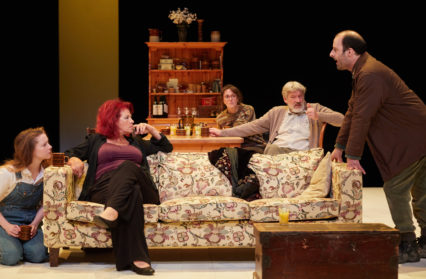Jemma Beggs reviews Anton Chekhov’s The Cherry Orchard, following the success of their two previous shows, Iphigenia in Splott and Killology.
Following the success of their two previous shows, Iphigenia in Splott and Killology, expectations could only be high for Rachel O’Riordan and Gary Owen’s latest production – a radical reimagining of Anton Chekhov’s The Cherry Orchard in which pre-revolutionary Russia is exchanged for a 1980’s Pembrokeshire, already caught in the clutches of The Iron Lady. Thematically, Chekhov and Owen’s versions are very similar; the gulf between the rich and poor, the battle between maintaining the status quo and modernisation and the cataclysmic effect of social change. Owen has stripped away the flesh of the original, extracting its very essence, and reconstructing a contemporary and culturally pertinent version of Chekhov’s masterpiece.
As the duo’s most classically structured piece yet, and their first to feature on the Sherman’s main stage, this potentially marks a new creative direction, with a shift towards a more traditional style for future productions. O’Riordan and Owen’s stylistic trademarks are still present, however. A tightly woven script plays out against a pared back set, including some key pieces with just enough character to effectively conjure up the play’s setting, yet possessing an unobtrusive quality which allows the actors to breathe life into the characters’ memories, so they take almost tangible form. The beauty of Owen’s scripts is always the powerful visuals he conjures up with words.
Such an expressive script could only flourish amongst talented actors, and here too, The Cherry Orchard does not disappoint. Rare is it to find such a consistently high standard throughout, yet the skill of the seven-strong cast is exceptional. If any are to be commended for a stand out performance, it’s Denise Black as the razor-tongued alcoholic, Rainey. Vicious and vulnerable in equal measures, Black’s wry delivery is superb, making her a focal point for much of the comedy, yet she is also the character who rouses the most emotion of the evening, once she allows the memories of her past to seep back in.
Historically, productions have struggled with the duality of The Cherry Orchard, striving to strike the right balance between comedy and tragedy. Owen’s adaptation straddles the divide well, yet undeniably weighs heavier on the humour with the quickfire repartee and verbal sparring. In this respect, although the script is fully engaging, there is a discernible lack of mounting tension. The second act maintains the same momentum as the first, not building to any big finale, and instead remaining on the already established plateau. Any potential for momentum is further hindered by the peculiar manner of the set changes, during which the stage is plunged into semi-darkness for minor adjustments to be made, whilst 80s new wave music blares a few decibels too loud.
The Cherry Orchard is undoubtedly a beautiful piece; intelligent without being snobbish, tragic without being gloomy, it exudes a delicate melancholy beneath all the sharp-edged humour. However, it misses the emotional sucker-punch to the gut now expected from an O’Riordan/Owen collaboration. The very final image is the kind to imprint itself on the memory and leave a delicious chill, but the ending overall is anticlimactic. Nevertheless, it holds its own as another great piece of theatre to add to Sherman Theatre’s repertoire, and at a time when they have faced criticism over their commitment to the Welsh language, The Cherry Orchard is a decidedly Welsh play, with more than a hint of pride and passion for its roots.
The Cherry Orchard is on until Nov 8.
(Image credit: Mark Douet)











